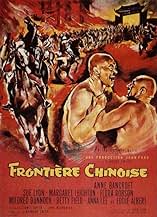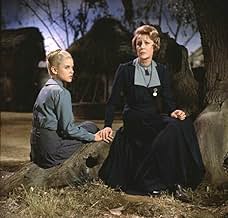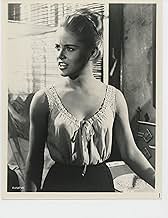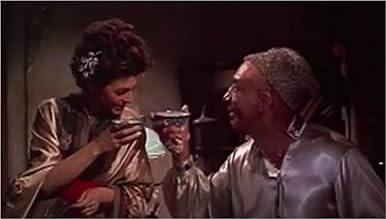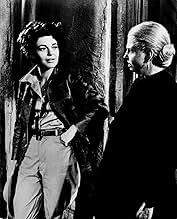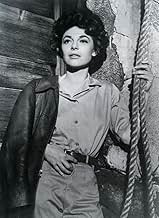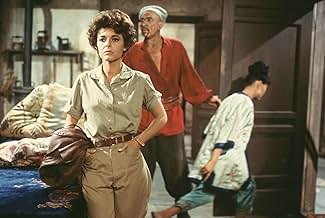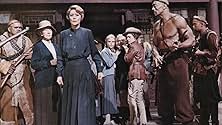AVALIAÇÃO DA IMDb
6,7/10
2,9 mil
SUA AVALIAÇÃO
Adicionar um enredo no seu idiomaIn 1935 China, seven dedicated missionary women try to protect themselves from the advances of a barbaric Mongolian warlord and his cut-throat gang of warriors.In 1935 China, seven dedicated missionary women try to protect themselves from the advances of a barbaric Mongolian warlord and his cut-throat gang of warriors.In 1935 China, seven dedicated missionary women try to protect themselves from the advances of a barbaric Mongolian warlord and his cut-throat gang of warriors.
- Direção
- Roteiristas
- Artistas
- Prêmios
- 1 indicação no total
Lee Kolima
- Warrior
- (não creditado)
- Direção
- Roteiristas
- Elenco e equipe completos
- Produção, bilheteria e muito mais no IMDbPro
Avaliações em destaque
7 Women (1966)
Anne Bancroft fans, check out the forgotten drama 7 Women. She plays a tough, capable woman doctor sent to a missionary in China. This isn't important, but her short, curly hair is just adorable. What is important is the setting: a small village with limited resources and impending doom. Margaret Leighton heads up the missionary, and even though she's received word that a ruthless Mongolian bandit is headed their way, she refuses to flee to a safer location. She believes that the bandits will respect their Christianity and leave them unharmed, but when Anne arrives, she scoffs at the notion that religion will protect them.
Eddie Albert and his pregnant wife, Betty Field, need Anne's services the most. As an older woman, the pregnancy could have complications, but they also refuse to leave. Sue Lyon is an impressionable girl who first looks up to Margaret and then Anne. Flora Robson and Mildred Dunnock are also in the supporting cast. What can seven women and one useless man (sorry, Eddie) do when faced with such terrible danger? This very tense drama has a lot going for it, but strong women beware: it's upsetting. You won't see the twists and turns coming, and when they happen you'll probably be in shock for a while. But you will think Anne Bancroft is the bravest lady ever.
Eddie Albert and his pregnant wife, Betty Field, need Anne's services the most. As an older woman, the pregnancy could have complications, but they also refuse to leave. Sue Lyon is an impressionable girl who first looks up to Margaret and then Anne. Flora Robson and Mildred Dunnock are also in the supporting cast. What can seven women and one useless man (sorry, Eddie) do when faced with such terrible danger? This very tense drama has a lot going for it, but strong women beware: it's upsetting. You won't see the twists and turns coming, and when they happen you'll probably be in shock for a while. But you will think Anne Bancroft is the bravest lady ever.
I wonder what feminists feel about this film. I found this work to be a fascinating look at women by a male director that can compare with two other cinematic works: Paul Mazursky's "The Unmarried Woman" and Muzaffar Ali's "Umrao Jaan". Strong women, weak women, lesbians, and immature girls, are contrasted with cardboard male characters that are never fully developed and are obviously no match to the array of women portrayed in the film. The men are painted so negatively that one begins to wonder if Ford thought Asian men had more brawn than brain--a strange view that has gained currency in Hollywood cinema.
I applaud Ford's decision to cast Anne Bancroft in this role. This is one of her strong performances. She makes even the most vapid films look elegant with her roles ("Lipstick", "Little Nikita", to name just two). Ford develops her role "7 women" on the lines of a Western gunslinger--only there are no gunfights. The woman has a weapon: sex. That weapon can down all the bad guys faster than it takes to down Mexicans, Red Indians, rustlers, bank-robbers. In this film these bad men are Chinese/Mongolian thugs. Established thespians Dame Flora Robson and Margaret Leighton are totally eclipsed by Bancroft's riveting performance.
What Ford wanted I guess was to stun the viewer with the ending--the twist preceded by the gradual softening of the Bancroft in men's clothes to the Bancroft in women's clothes and the acceptance of male superiority. Most critics have found the end facile but I found the end was powerful as it makes you review and reconsider the strength of the lead character.
The film questions established views on religion; evidently Ford was old enough to have seen enough to choose to make this film in the evening of his life. In his films, Ford's women are as interesting as any other aspect of his cinema and this film provides ample fodder for those interested in studying this element of Ford's work.
However, for a 1966 film, the studio sets for the film look too artificial for the serious cinema the film offers. If anything, the film makes the viewer think!
I applaud Ford's decision to cast Anne Bancroft in this role. This is one of her strong performances. She makes even the most vapid films look elegant with her roles ("Lipstick", "Little Nikita", to name just two). Ford develops her role "7 women" on the lines of a Western gunslinger--only there are no gunfights. The woman has a weapon: sex. That weapon can down all the bad guys faster than it takes to down Mexicans, Red Indians, rustlers, bank-robbers. In this film these bad men are Chinese/Mongolian thugs. Established thespians Dame Flora Robson and Margaret Leighton are totally eclipsed by Bancroft's riveting performance.
What Ford wanted I guess was to stun the viewer with the ending--the twist preceded by the gradual softening of the Bancroft in men's clothes to the Bancroft in women's clothes and the acceptance of male superiority. Most critics have found the end facile but I found the end was powerful as it makes you review and reconsider the strength of the lead character.
The film questions established views on religion; evidently Ford was old enough to have seen enough to choose to make this film in the evening of his life. In his films, Ford's women are as interesting as any other aspect of his cinema and this film provides ample fodder for those interested in studying this element of Ford's work.
However, for a 1966 film, the studio sets for the film look too artificial for the serious cinema the film offers. If anything, the film makes the viewer think!
John Ford ended his narrative feature filmmaking career with something different, a story about women instead of men. It's a bit of a mixed bag of a film, showing a lot of the errant storytelling that had become more prevalent of Ford's film in his final decade, but a surprisingly stark ending helps elevate the material in a way that I had not been expecting. Reminding me of how Hitchcock went out with Family Plot, a smaller, lesser film that still managed to entertain while also demonstrating the strengths the filmmaker had developed over the decades.
In a remote mission in rural China, a group of women and one man teach the local children English and in the ways of Christ. One of them, Florrie (Betty Field), is pregnant, nearly due, and having been brought to the mission by her husband Charles (Eddie Albert). The head of the mission, Agatha (Margaret Leighton), has seen the need for a doctor, so she has arranged for the arrival of Dr. D. R. Cartwright (Anne Bancroft), who happens to be a woman, a twist Agatha had not foreseen. What seems like the undergirding conflict of the film will be between the deliriously religious Agatha against the sardonically secular Dr. Cartwright. It never really comes to fruition, though. It's set up so that Agatha and Dr. Cartwright will be duking it out rhetorically and morally for the soul of young Emma (Sue Lyon), the youngest of the missionaries.
What happens instead is a sudden outbreak of cholera after the battle lines of personality have been drawn. With the encroaching march of the Mongolian warlord Tunga Khan (Mike Mazurki), another British mission has abandoned their location and fled to the mission led by Agatha. With them came cholera, and Dr. Cartwright takes charge. She's assertive and action oriented, getting the mission moving in a way that can deal with the outbreak with minimal loss of life, and then it's suddenly over. We go from one scene where the outbreak is on the verge of being taken care of to a celebratory dinner (that Agatha insists on making dour while Cartwright insists on breaking open a bottle of scotch to celebrate) in a cut. I thought it was going to be a running plot element through the rest of the movie, and then it was suddenly over. Okay. Moving on.
That's the first half of the movie, and it's far from great. As a story unto itself, it's oddly built and unsatisfying. As the first half of what comes next, it's still curious but the basic story elements of Cartwright's character, the pregnancy, and the setting have been established well enough to go into what seems to become the point of the film. Tunga Khan arrives with his horde and takes up residence in the mission, Charles having been killed in the village when he tried to help a young girl being raped. He shoves the women into a wooden shed, and Cartwright needs to take charge as much as she can, especially when Florrie goes into labor. Cartwright becomes the face of the women when negotiating with Tunga Khan, offering up her own body as ransom for her medical supplies, hot water, and food.
It would have been better had Cartwright's character been a greater focus of the first half, though. There's little about why she came to rural China for a job. She talks about how women doctors aren't given opportunities to work and that she was also running from a failed relationship with a married man, but that's about it. I don't think enough is given to her early to make these early decisions terribly impactful. It's a strong moment from Bancroft, carrying the weight of her decision well, but I just think it could have been better set up.
This moves us into the film's finale where Cartwright essentially becomes Tunga Khan's prize, his queen. A good thing about this later section of the film is Khan himself. There's no good side to Khan. He's a barbarian and a monster, unrepentant about his crimes and even kills one of his own men (Woody Strode) in one-on-one combat just because. There's no negotiating with this man, no appealing to his humanity. His interest in human life is only what can profit him. So, Cartwright does what she can to provide the freedom of the other women, the titular seven. She gives herself fully to him.
Now, up to this point, I was kind of seesawing back and forth about the movie's worth as a whole, but then the final scene happened. I loved it. It was an ending both dark and hopeful at the same time. It goes to a place with Cartwright that feels just right after what she had gone through and seen in the second half. I think it saves the movie.
I've felt a certain fatigue in Ford's work as his career came to an end, but despite that exhaustion he still manages a solid little tale with his final narrative feature film. It may take until the final moments to push it to that level, but it does get there in the end.
In a remote mission in rural China, a group of women and one man teach the local children English and in the ways of Christ. One of them, Florrie (Betty Field), is pregnant, nearly due, and having been brought to the mission by her husband Charles (Eddie Albert). The head of the mission, Agatha (Margaret Leighton), has seen the need for a doctor, so she has arranged for the arrival of Dr. D. R. Cartwright (Anne Bancroft), who happens to be a woman, a twist Agatha had not foreseen. What seems like the undergirding conflict of the film will be between the deliriously religious Agatha against the sardonically secular Dr. Cartwright. It never really comes to fruition, though. It's set up so that Agatha and Dr. Cartwright will be duking it out rhetorically and morally for the soul of young Emma (Sue Lyon), the youngest of the missionaries.
What happens instead is a sudden outbreak of cholera after the battle lines of personality have been drawn. With the encroaching march of the Mongolian warlord Tunga Khan (Mike Mazurki), another British mission has abandoned their location and fled to the mission led by Agatha. With them came cholera, and Dr. Cartwright takes charge. She's assertive and action oriented, getting the mission moving in a way that can deal with the outbreak with minimal loss of life, and then it's suddenly over. We go from one scene where the outbreak is on the verge of being taken care of to a celebratory dinner (that Agatha insists on making dour while Cartwright insists on breaking open a bottle of scotch to celebrate) in a cut. I thought it was going to be a running plot element through the rest of the movie, and then it was suddenly over. Okay. Moving on.
That's the first half of the movie, and it's far from great. As a story unto itself, it's oddly built and unsatisfying. As the first half of what comes next, it's still curious but the basic story elements of Cartwright's character, the pregnancy, and the setting have been established well enough to go into what seems to become the point of the film. Tunga Khan arrives with his horde and takes up residence in the mission, Charles having been killed in the village when he tried to help a young girl being raped. He shoves the women into a wooden shed, and Cartwright needs to take charge as much as she can, especially when Florrie goes into labor. Cartwright becomes the face of the women when negotiating with Tunga Khan, offering up her own body as ransom for her medical supplies, hot water, and food.
It would have been better had Cartwright's character been a greater focus of the first half, though. There's little about why she came to rural China for a job. She talks about how women doctors aren't given opportunities to work and that she was also running from a failed relationship with a married man, but that's about it. I don't think enough is given to her early to make these early decisions terribly impactful. It's a strong moment from Bancroft, carrying the weight of her decision well, but I just think it could have been better set up.
This moves us into the film's finale where Cartwright essentially becomes Tunga Khan's prize, his queen. A good thing about this later section of the film is Khan himself. There's no good side to Khan. He's a barbarian and a monster, unrepentant about his crimes and even kills one of his own men (Woody Strode) in one-on-one combat just because. There's no negotiating with this man, no appealing to his humanity. His interest in human life is only what can profit him. So, Cartwright does what she can to provide the freedom of the other women, the titular seven. She gives herself fully to him.
Now, up to this point, I was kind of seesawing back and forth about the movie's worth as a whole, but then the final scene happened. I loved it. It was an ending both dark and hopeful at the same time. It goes to a place with Cartwright that feels just right after what she had gone through and seen in the second half. I think it saves the movie.
I've felt a certain fatigue in Ford's work as his career came to an end, but despite that exhaustion he still manages a solid little tale with his final narrative feature film. It may take until the final moments to push it to that level, but it does get there in the end.
For a film nut like me. 7 Women offers a plethora of pleasures. Patricia Neal was suppose to star but ill health made her unavailable. Anne Bancroft took over as the drinking, smoking, swearing saint. and all the aspects of this complex character are totally real in Anne Bancroft's face. She arrives to the Mission in China like a benevolent tornado. The spectacular Margaret Leighton is the head of the Mission and she plays it like a raw nerve, Among the other women, Flora Robson, Queen Elizabeth to Laurence Olivier's Michael Ingolby in Fire Over England, brings a voice of reason that reassure us, Betty Field , Kim Novak's mother in Picnic, among a gallery of memorable characters, plays the pregnant middle age woman who offends the Christian mission for having had sex with her husband under their roof. Mildred Dunnock, Anna Lee and even Stanley Kubrick's Lolita, Sue Lyon is part of the Mission. On the other side, the villains, that offended so many people, John Ford casts his longtime companion Woody Strode. I understand and even accept all the criticisms listed in the reviews of this pages but, somehow, I can put all that aside and enjoy the plethora of pleasures that it offers.
...what a moving last picture for Ford's swansong.Too often underrated ,"Seven woman" in spite of a sometimes weak script-too many things happen in too little time- is perhaps the most modern film in Ford 's canon.
We find one of Ford's permanent features:a group of human beings in jeopardy who's got to struggle against an enemy:"Stagecoach" is the best example .Dudley Nichols's screenplay was inspired by Guy de Maupasssant's "Boule de Suif".
Women always played a prominent part in Ford's canon.Ford's world is deceptive :it seems to be a male world but actually women are the strongest and the wisest (Jane Darwell's character in "Wagon Master" ,the soldiers' wives in "Fort Appache" ).It was only natural that Ford's last movie was an all-women film (all men,including Albert's character are caricatures.) And these women are very endearing.Anne Bancroft,one of the greatest actresses America ever had, shines all along the movie ,and even when the script verges on grotesque ,she's still beaming, fascinating ,never losing her sense of humor.Even when she "becomes Chinese" ,nobody would think of laughing at her.She's so strong an actress that we seem to know her heroine intimately,her life in NYC people dispensaries,her sad love stories.With her masculine swagger,her boots ,her cigarettes and her whiskey we see a broken woman who has lost all her illusions.She's an atheist,which is very rare in Ford's canon.
Religion is in the center of many a Ford movie ."Seven Women" takes place in a mission .All these women put their faith in God and ...in America (We're American citizens!).One of them (Margaret Leighton) is particularly interesting : a tight-lipped puritan at the beginning of the movie,she becomes,slowly but inexorably ,a mystic lunatic,mentioning Babylon and sinners.Like "Stagecoach" ,"seven femmes " borrows from Maupassant.Like his heroine,"Boule De suif" Cartwright gives her life in sacrifice so the others can survive.
Six Woman are leaving Sodom under an ominous sky :one of them is screaming about lust while the blonde schoolteacher (Sue Lyon,whose role is an equivalent of Caroll Baker's in "Cheyenne Autumn ,though it's an underwritten part ),along with the newborn child, represents hope for the future:all that she went through ,her late heroine (she was the only one to be nice with Cartwright when she arrived)might help her to carry on.But Ford's last opus,like Huston's "the dead" is a very pessimistic opus.
We find one of Ford's permanent features:a group of human beings in jeopardy who's got to struggle against an enemy:"Stagecoach" is the best example .Dudley Nichols's screenplay was inspired by Guy de Maupasssant's "Boule de Suif".
Women always played a prominent part in Ford's canon.Ford's world is deceptive :it seems to be a male world but actually women are the strongest and the wisest (Jane Darwell's character in "Wagon Master" ,the soldiers' wives in "Fort Appache" ).It was only natural that Ford's last movie was an all-women film (all men,including Albert's character are caricatures.) And these women are very endearing.Anne Bancroft,one of the greatest actresses America ever had, shines all along the movie ,and even when the script verges on grotesque ,she's still beaming, fascinating ,never losing her sense of humor.Even when she "becomes Chinese" ,nobody would think of laughing at her.She's so strong an actress that we seem to know her heroine intimately,her life in NYC people dispensaries,her sad love stories.With her masculine swagger,her boots ,her cigarettes and her whiskey we see a broken woman who has lost all her illusions.She's an atheist,which is very rare in Ford's canon.
Religion is in the center of many a Ford movie ."Seven Women" takes place in a mission .All these women put their faith in God and ...in America (We're American citizens!).One of them (Margaret Leighton) is particularly interesting : a tight-lipped puritan at the beginning of the movie,she becomes,slowly but inexorably ,a mystic lunatic,mentioning Babylon and sinners.Like "Stagecoach" ,"seven femmes " borrows from Maupassant.Like his heroine,"Boule De suif" Cartwright gives her life in sacrifice so the others can survive.
Six Woman are leaving Sodom under an ominous sky :one of them is screaming about lust while the blonde schoolteacher (Sue Lyon,whose role is an equivalent of Caroll Baker's in "Cheyenne Autumn ,though it's an underwritten part ),along with the newborn child, represents hope for the future:all that she went through ,her late heroine (she was the only one to be nice with Cartwright when she arrived)might help her to carry on.But Ford's last opus,like Huston's "the dead" is a very pessimistic opus.
Você sabia?
- CuriosidadesAnne Bancroft recalled producer and director John Ford's tearing pages out of the script and described him as "Marvelous but loony."
- Erros de gravaçãoDr. Cartwright's hairstyle is not out of place for 1935. Dr. Cartwright is a strong, independent woman and it is not unusual for her to have this type of hairstyle - see Amelia Earhart. Besides, short hair worn off the shoulder was a very popular style in the 1930s.
- Citações
Dr. D.R. Cartwright: [to Tunga Khan, Bandit Leader] So long, ya bastard!
- Cenas durante ou pós-créditosPROLOGUE: "1935: North China near the border of Mongolia...A land of feudal war lords and marauding bandit armies...A time of lawlessness and violence."
- ConexõesReferenced in MGM 40th Anniversary (1964)
- Trilhas sonorasJesus Loves Me
(uncredited)
Words by Anna B. Warner and David Rutherford McGuire
Music by William B. Bradbury
Sung by Sue Lyon and the children
Principais escolhas
Faça login para avaliar e ver a lista de recomendações personalizadas
- How long is 7 Women?Fornecido pela Alexa
Detalhes
- Data de lançamento
- País de origem
- Idiomas
- Também conhecido como
- Sete Mulheres
- Locações de filme
- Empresas de produção
- Consulte mais créditos da empresa na IMDbPro
Bilheteria
- Orçamento
- US$ 2.300.000 (estimativa)
- Faturamento bruto mundial
- US$ 228
- Tempo de duração
- 1 h 27 min(87 min)
- Cor
- Proporção
- 2.35 : 1
Contribua para esta página
Sugerir uma alteração ou adicionar conteúdo ausente


